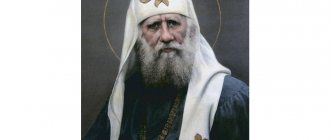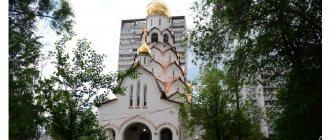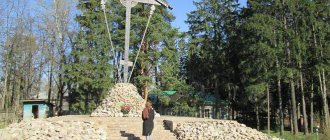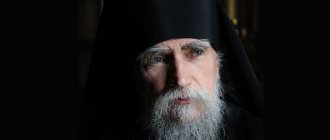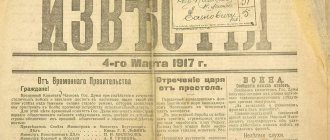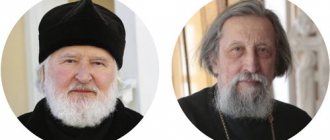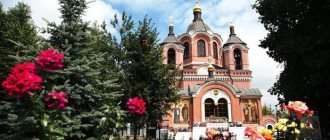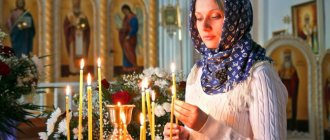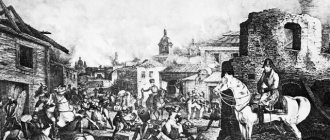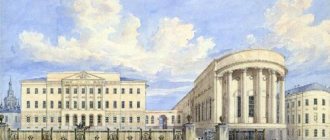Church of the New Martyrs and Confessors of Russia in Strogino
April 10, 2022 In the time that many people have freed up due to forced self-isolation, in addition to prayer, it can be usefully used for spiritual education.
For example, watch video recordings of lectures of educational courses for the laity “Orthodoxy” the Sretensky Theological Seminary for the sixth year now . The courses are structured according to the plan of higher church theological schools. Lectures are given by the best specialists in their fields from various educational institutions. You can either systematically master some subject of religious doctrine or choose a lecture on a topic of interest. The lectures were well recorded; it is important that after each lecture you could ask questions, the answers to which were also recorded.
Educational courses “Orthodoxy” have become an important event in the spiritual life of the Church.
Many have read the Psalter and remember the words with which its most famous kathisma, the seventeenth, begins: Blessed are the blameless on the way, walking in the law of the Lord. Blessed are those who experience His witness; they will seek Him with all their hearts.
…
This is exactly what the educational courses that opened at the Sretensky Monastery and the Sretensky Theological Seminary in 2014 were called - “The Seventeenth Kathisma” (another name is “Orthodoxy”).
So many people came to the first lecture that we had to figure out how to accommodate everyone. A solution was found: some of the listeners sat in the conference room, and some sat on the floor above, in classrooms where the lecture was broadcast on projection screens.
What struck the project initiators most was the abundance of young people who came to enroll in the courses. More than 500 people! The average age of listeners is 28–30 years old, men and women are almost equally divided. Of those who came, 90% turned out to be people with higher education - there were even doctors and candidates of science among them.
For those who did not have time to sign up or were unable to find Monday evening in their busy schedule, video lectures were recorded. Their online viewing statistics were another surprise: each entry was seen by up to 30,000 people or more.
What do they teach in the courses and how do they differ from others like them?
Immersion in the times of King David and the Apostle Paul
From the first lecture, it became clear that the audience did not just come “to talk about something with the priest.” They were interested in everything - from the interpretation of Biblical history to the subtleties of Orthodox dogma. As one of the teachers, Archpriest Vadim Leonov, says, at first he “ hesitated whether to present some complex issues of triadology and Christology.”
But as the conversations progressed, it became clear that there was no problem in the level of perception.
There is only a difficulty with time: it is limited. “ I confess that I am eternally grateful to our wonderful listeners for the fact that every Monday they found the opportunity to break away from their important affairs and come to the center of Moscow, to the Sretensky Monastery, to listen about God and the salvation of the soul
,” the lecturer added.
The courses are based on the curriculum of the higher theological school of the Russian Orthodox Church. Teachers - teachers of Sretensky Seminary and other theological schools, priests and laity, specialists in liturgics, biblical studies, dogmatics: famous liturgist, priest Mikhail Zheltov, biblical scholar and participant in numerous expeditions on biblical archeology, Archpriest Alexander Timofeev, regular contributor to the Pravoslavie.Ru portal and author of many popular books, Archpriest Andrei Tkachev. And many others.
Students of the “Orthodoxy” courses immersed themselves in the era of the Flood, the times of Kings David and Solomon, traced the paths of the missionary travels of the Apostle Paul and delved into his messages. And the point is not to simply assimilate and learn new information, increasing your educational level. Not only the mind changes, but slowly the heart too. “ The main thing that lectures give is the awakening of the desire to read and study the Holy Scriptures
“
says
Maxim Dobrolyubov, one of the project participants
.
The format of the meetings is lectures, at the end of which listeners can ask what remains unclear or requires clarification. The questions asked in the audience, according to the rector of Sretensky Seminary, Bishop Tikhon (Shevkunov), “ sometimes were simply amazing: wonderful, deep, telling how seriously the listeners feel spiritual life, how interested they are in learning as much as possible about it.” .
Courses for the laity “Orthodoxy”
1st year of study (2014-2015):
Course "Biblical History" and "Dogmatic Theology"
2nd year of study (2015-2016):
Course “Church History: Between Heaven and Earth”
- 1st half of the year (September-December 2015). General church history
- 2nd half of the year (January-June 2016). History of the Russian Church
3rd year of study (2016-2017):
Course "God and Man"
- 1st half of the year (October-December 2016). Anthropology and asceticism
- 2nd half of the year (January-June 2022). Liturgics
4th year of study (2017–2018):
Course "Christian Family"
5th year of study (2018–2019):
- 1st half of the year (September-December 2022). "Symbol of faith"
- 2nd half of the year (January-June 2022). “Practical life experience of outstanding pastors of the 19th – 20th centuries”
6th year of study (2019–2020):
- 1st half of the year (September-December 2022). "Pasions and the fight against them"
Moscow Sretenskaya Theological Academy
HomeLife of the Academy Orthodox educational courses
Orthodox educational courses
“Blessed are those who experience His visions”
What struck the project initiators most was the abundance of young people who came to enroll in the courses. More than 500 people! The average age of listeners is 28–30 years old, men and women are almost equally divided. Of those who came, 90% turned out to be people with higher education - there were even doctors and candidates of science among them.
Many have read the Psalter and remember the words with which its most famous kathisma, the seventeenth, begins: Blessed are the blameless on the way, walking in the law of the Lord. Blessed are those who experience His witness; they will seek Him with all their hearts.
…
This is exactly what the educational courses that opened at the Sretensky Monastery and the Sretensky Theological Academy in 2014 were called - “The Seventeenth Kathisma” (another name for them is “Orthodoxy”).
So many people came to the first lecture that we had to figure out how to accommodate everyone. A solution was found: some of the listeners sat in the conference room, and some sat on the floor above, in classrooms where the lecture was broadcast on projection screens.
Prayer before the first lesson
For those who did not have time to sign up or were unable to find Monday evening in their busy schedule, video lectures were recorded. Their online viewing statistics were another surprise: each entry was seen by up to 30,000 people or more.
What do they teach in the courses and how do they differ from others like them?
Immersion in the times of King David and the Apostle Paul
From the first lecture, it became clear that the audience did not just come “to talk about something with the priest.” They were interested in everything - from the interpretation of Biblical history to the subtleties of Orthodox dogma. As one of the teachers, Archpriest Vadim Leonov, says, at first he “ hesitated whether to present some complex issues of triadology and Christology.”
But as the conversations progressed, it became clear that there was no problem in the level of perception.
There is only a difficulty with time: it is limited. “ I confess that I am eternally grateful to our wonderful listeners for the fact that every Monday they found the opportunity to break away from their important affairs and come to the center of Moscow, to the Sretensky Monastery, to listen about God and the salvation of the soul
,” the lecturer added.
Students of educational courses “Orthodoxy”
The courses are based on the curriculum of the highest theological school of the Russian Orthodox Church. Teachers - teachers of the Sretensky Academy and other theological schools, priests and laity, specialists in liturgics, biblical studies, dogmatics: the famous liturgist, priest Mikhail Zheltov, biblical scholar and participant in numerous expeditions on biblical archeology, Archpriest Alexander Timofeev, regular contributor to the Pravoslavie.Ru portal and author of many popular books, Archpriest Andrei Tkachev. And many others.
Students of the “Orthodoxy” courses immersed themselves in the era of the Flood, the times of Kings David and Solomon, traced the paths of the missionary travels of the Apostle Paul and delved into his messages. And the point is not to simply assimilate and learn new information, increasing your educational level. Not only the mind changes, but slowly the heart too. “ The main thing that lectures give is the awakening of the desire to read and study the Holy Scriptures
“
says
Maxim Dobrolyubov, one of the project participants
.
The “Orthodoxy” courses are designed for two years. In the first year, listeners are introduced to the Holy Scriptures (after all, according to St. Seraphim of Sarov, “ the mind of an Orthodox Christian should swim in the Word of God”)
and dogmatic theology, and in the second year - with the history of the Church.
The format of the meetings is lectures, at the end of which listeners can ask what remains unclear or requires clarification. The questions asked in the audience, according to the rector of the Sretensky Academy, Bishop Tikhon (Shevkunov), “ sometimes were simply amazing: wonderful, deep, showing how seriously the listeners feel spiritual life, how interested they are in learning as much as possible about it.” .
At the end of the first year of study, the organizers conducted a test on Biblical history. The results showed that Father Rector was not at all mistaken in his assessment.
Bishop Tikhon (Shevkunov) among the course participants
Feeling the Reality of Biblical History
On June 6, 2015, Archimandrite Tikhon and other teacher-priests served the night liturgy, during which graduates of the Sretensky educational courses prayed with them. The temple was full, everyone present received the Holy Mysteries of Christ. Thus, the first stage of the project ended with the joy of joint prayer.
Night Divine Liturgy
***
For a whole year, several dozen Muscovites, taking time away from important matters, entertainment and the comfort of their apartments, came on Monday evenings to the Sretensky Monastery. What have they learned during this period? What did you find?
«My view of the world has changed, it has become deeper, more meaningful,
- said one of the listeners, Roman.
“ The most important thing is that so many people came together to study the Holy Scriptures
.”
Sharing their impressions, people said that the courses at the Sretensky Academy and the Sretensky Monastery helped them organize their previously scattered and superficial knowledge about their faith and establish themselves in it, and thanks to being among like-minded people, many were able to truly feel their unity with the Church. “ Look at the full assembly hall of Sretensky Theological Seminary!
- said graduate Yulia
.
“It’s joyful to see that all those gathered are united by one thing - love for God.” It inspires and gives strength. It’s happiness that you can feel this not only in church during prayer, but also here, in the classroom.” ***
Another discovery is the joy of an unexpected discovery: forefathers, prophets, judges, who had previously been like fairy-tale characters for many, became real, living people as they were recognized. The closeness of the angelic world became undeniable and genuine, the apostles became close, as if you knew them personally. “ If earlier I perceived the Old Testament narrative with a certain shade of fabulousness, then after the courses I began to feel the closeness of Biblical history, its complete reality
“,” added one of the listeners.
"Scattered knowledge
- another graduate reasoned, -
they came into the system.
Now there is an opportunity to more reasonably answer questions from relatives, friends and colleagues about the Church.” But are all graduates called from now on to a special service - missionary, apostolic? " No,
- Archimandrite Tikhon says in his opening address to the course participants.
— The main thing is to absorb and assimilate the knowledge that is given to you.
Whatever the Lord calls each of you is His business. It is important to seek God, His will. This is the main task of human life, great, beautiful, incomparable .”
***
In the 2015/16 academic year, educational courses “Orthodoxy” continued to operate as usual. The theme of the new school year was the history of the Church. Listeners will experience the dramatic struggle of the Church for the purity of the Christian faith.
Orthodox educational courses. 1st year of study (2014–2015)
| Previous | Next |
Lecture 1. Opening speech by Archimandrite. Tikhon (Shevkunova). Bible story | 09:25 |
Lecture 1. Kupriyanov F.A. The emergence of the world and man. God's Covenants with Adam and Noah | 56:45 |
Lecture 1. Kupriyanov F.A. The emergence of the world and man. God's covenants with Adam and Noah. Answers on questions | 44:44 |
Lecture 2. Kupriyanov F.A. From the election of Abraham to the migration of the Jewish people to Egypt | 1:08:41 |
Lecture 2. Kupriyanov F.A. From the election of Abraham to the migration of the Jewish people to Egypt. Answers on questions | 49:19 |
Lecture 3. Prot. Vadim Leonov. What is theology? | 1:11:11 |
Lecture 3. Prot. Vadim Leonov. What is theology? Answers on questions | 43:55 |
Lecture 4. Kupriyanov F.A. Exodus from Egypt | 54:14 |
Lecture 4. Kupriyanov F.A. Exodus from Egypt. Answers on questions | 57:59 |
Lecture 5. Prot. Alexander Timofeev. From entering the Promised Land to the establishment of royal power | 1:13:53 |
Lecture 5. Prot. Alexander Timofeev. From entering the Promised Land to the establishment of royal power. Answers on questions | 47:19 |
Lecture 6. Prot. Vadim Leonov. Searching for God | 1:05:30 |
Lecture 6. Prot. Vadim Leonov. Searching for God. Answers on questions | 50:10 |
Lecture 7. Priest. Mikhail Zheltov. From Saul to David | 1:18:50 |
Lecture 7. Priest. Mikhail Zheltov. From Saul to David. Answers on questions | 47:16 |
Lecture 8. Skobelev M.A. From David to Solomon | 1:13:03 |
Lecture 8. Skobelev M.A. From David to Solomon. Answers on questions | 39:26 |
Lecture 9. Prot. Vadim Leonov. God's Revelation About Himself | 1:11:59 |
Lecture 9. Prot. Vadim Leonov. God's revelation about Himself. Answers on questions | 53:53 |
Lecture 10. Priest. Andrey Vydrin. From the division of the kingdom to the destruction of the temple by the Babylonians | 1:05:27 |
Lecture 10. Priest. Andrey Vydrin. From the division of the kingdom to the destruction of the temple by the Babylonians. Answers on questions. | 56:06 |
Lecture 11. Diak. Vladimir Vasilik. Twelve "minor" prophets | 1:07:25 |
Lecture 11. Diak. Vladimir Vasilik. Twelve "minor" prophets. Answers on questions | 42:23 |
Lecture 12. Prot. Vadim Leonov. Creation of the world | 1:14:37 |
Lecture 12. Prot. Vadim Leonov. Creation of the world. Answers on questions | 55:09 |
Lecture 13. Prot. Andrey Tkachev. Prophets Isaiah, Jeremiah, Ezekiel | 1:44:38 |
Lecture 13. Prot. Andrey Tkachev. Prophets Isaiah, Jeremiah, Ezekiel. Answers on questions | 36:14 |
Lecture 14. Starodubtsev O.V. In captivity in Babylon. Return from captivity | 1:09:35 |
Lecture 14. Starodubtsev O.V. In captivity in Babylon. Return from captivity. Answers on questions | 51:50 |
Lecture 15. Prot. Vadim Leonov. Primordial man | 1:25:26 |
Lecture 15. Prot. Vadim Leonov. Primordial man. Answers on questions | 37:52 |
Lecture 16. Jerome. Jonah Kudryakov. From Persia to Alexander the Great | 1:43:58 |
Lecture 17. Prot. Vadim Leonov. The image of God in man. | 1:13:08 |
Lecture 17. Prot. Vadim Leonov. The image of God in man. Answers on questions | 33:46 |
Lecture 18. Diak. Vladimir Vasilik. Nativity. Adoration of the Magi. Epiphany | 1:39:38 |
Lecture 18. Diak. Vladimir Vasilik. Nativity. Adoration of the Magi. Epiphany. Answers on questions | 16:29 |
Lecture 19. Jerome. Irenaeus (Pikovsky). Sermon on the Mount: New Law poured into new wineskins | 1:30:23 |
Lecture 19. Jerome. Irenaeus (Pikovsky). Sermon on the Mount: New Law poured into new wineskins. Answers on questions | 51:54 |
Lecture 20. Prot. Vadim Leonov. The Fall of the First People and Its Consequences | 1:14:59 |
Lecture 20. Prot. Vadim Leonov. The fall of the first people and its consequences. Answers on questions | 35:32 |
Lecture 21. Prot. Andrey Tkachev. Teaching in parables about the Kingdom of God | 1:33:47 |
Lecture 21. Prot. Andrey Tkachev. Teaching in parables about the Kingdom of God. Answers on questions | 1:01:27 |
Lecture 22. Prot. Vadim Leonov. Who is Jesus Christ? | 1:17:26 |
Lecture 22. Prot. Vadim Leonov. Who is Jesus Christ? Answers on questions | 38:27 |
Lecture 23. Prot. Andrey Tkachev. Miracles of the Lord. Transfiguration. Raising Lazarus | 2:25:07 |
Lecture 24. Jerome. Irenaeus (Pikovsky). Holy Week: from the Entry of the Lord into Jerusalem to the Last Supper | 2:15:19 |
Lecture 25. Prot. Vadim Leonov. Redemption | 1:21:57 |
Lecture 25. Prot. Vadim Leonov. Redemption. Answers on questions | 37:36 |
Lecture 26. Kupriyanov F.A. Last Supper. The Trial of Jesus Christ | 53:42 |
Lecture 26. Kupriyanov F.A. Last Supper. The trial of Jesus Christ. Answers on questions | 53:09 |
Lecture 27. Prot. Andrey Rakhnovsky. Events from the Resurrection of the Lord to the descent of the Holy Spirit on the day of Pentecost | 1:29:26 |
Lecture 27. Prot. Andrey Rakhnovsky. Events from the Resurrection to the descent of the Holy Spirit on the day of Pentecost. Answers | 35:46 |
Lecture 28. Prot. Vadim Leonov. Church | 1:08:51 |
Lecture 28. Prot. Vadim Leonov. Church. Answers on questions | 46:38 |
Lecture 29. Prot. Andrey Rakhnovsky. Missionary Travels of the Apostle Paul and His Epistles | 1:19:03 |
Lecture 29. Prot. Andrey Rakhnovsky. Missionary travels of the Apostle Paul and his Epistles. Answers on questions | 38:46 |
Lecture 30. Prot. Andrey Tkachev. Theology of the Apostle Paul | 1:25:03 |
Lecture 30. Prot. Andrey Tkachev. Theology of the Apostle Paul. Answers on questions | 56:46 |
Lecture 31. Prot. Vadim Leonov. Path to heaven | 1:18:42 |
Lecture 31. Prot. Vadim Leonov. Path to heaven. Answers on questions | 36:50 |
Lecture 32. Nebolsin A.S. Revelation of John the Evangelist | 1:06:20 |
Lecture 32. Nebolsin A.S. Revelation of John the Theologian. Answers on questions | 1:03:51 |
Lecture 33. Prot. Vadim Leonov. Future life | 1:18:09 |
Word from Archimandrite Tikhon (Shevkunov) upon completion of Orthodox educational courses | 22:05 |
Weekly Orthodox educational courses continue at Sretensky Theological Seminary. The rector of the Sretensky Theological Seminary, the abbot of the Sretensky Monastery, Archimandrite Tikhon (Shevkunov), said that within the framework of the two-year program it is planned to study courses in Biblical history, dogmatic theology, liturgics, Church history, as well as practical aspects of modern mission and apologetics.
Videos: Course “Church History: Between Heaven and Earth.” 2nd year (2015–2016) Course “God and Man”. 3rd year (2016–2017) Course “Christian Family”. 4th year (2017–2018) Course “Creed”. 5th year (2018–2019) Course “Pasions and the fight against them.” 6th year (2019–2020) Course “The Lord is my enlightenment.” Year 7 (2020–2021)
Audio recordings: 1st year of study (2014–2015) 2nd year of study (2015–2016) 3rd year of study (2016–2017) 4th year of study (2017–2018) 5th year of study (2018– 2019) 6th year of study (2019–2020) 7th year of study (2020–2021)
Fedor Alekseevich Kupriyanov - teacher of the Old Testament at Sretensky Seminary, candidate of sciences, associate professor. Archpriest Vadim Leonov is a candidate of theology, associate professor at the Orthodox St. Tikhon's Humanitarian University and Sretensky Theological Seminary. Archpriest Alexander Timofeev, head of the department of biblical studies at the Moscow Theological Academy, teacher and participant in numerous expeditions on biblical archeology. Priest Mikhail Zheltov - Candidate of Theology, Associate Professor of the Moscow Theological Academy, Head of the Department of Church-Practical Sciences of the All-Church Postgraduate and Doctoral Studies named after Sts. Equal-to-the-Apostles Cyril and Methodius, Secretary of the Commission on Divine Services and Church Art of the Inter-Council Presence of the Russian Orthodox Church. Priest Andrey Vydrin, teacher of the Old Testament at the Moscow Orthodox Theological Seminary and Academy. Deacon Vladimir Vasilik is a teacher at Sretensky Theological Seminary, candidate of theology and philological sciences, associate professor of the history department of St. Petersburg State University. Oleg Viktorovich Starodubtsev is an associate professor at the Moscow Theological Academy, a teacher at Sretensky Theological Seminary. Hieromonk Jonah (Kudryakov), teacher at Sretensky Theological Seminary. Hieromonk Irenei (Pikovsky), teacher at Sretensky Theological Seminary. Hieromonk Irinei (Pikovsky), teacher at Sretensky Theological Seminary.
Entry: ORTHODOLOGY.RU
- Home page
- –
- Spiritual center
- –
- Theological courses
Class schedule 2021-2022 . For any questions, please contact Oksana +7 906 084-4198.
Parish Theological Courses named after. Rev. Sergius of Radonezh Mytishchi branch No. 1 in the Donskoy Church.
Charter
Teachers
Schedule
Disciplines for self-study
Topics for graduation and practical work
Final works
We bring to your attention educational presentations prepared by students of Theological courses on the topic:
1. History of the temple 2. Construction of the temple 3. Vestments
In the 3rd year, a thesis is expected to be written. The student can optionally choose to either perform practical work or cover a theoretical issue in one of the disciplines being studied. The volume of written work is 50-60 printed pages. When completing your thesis, you should follow the guidelines.
CHARTER
I. _
Management of theological courses.
Parish Theological Courses are a division of the Perlovsky Spiritual and Educational Center at the Church of the Don Icon of the Mother of God and are under the authority of the Director of the Perlovsky Spiritual and Educational Center, appointed by the Rector of the temple and reporting to him. The Director is assisted by the Deputy for Academic Affairs, as well as the prefects of the first, second and third years, appointed by the Director with the consent of the majority of students.
II . The purpose of the Theological courses.
The purpose of the Theological courses is to introduce a person into the life of the Church, the formation of Orthodox ideas and systematic knowledge about God, the world, man, and spiritual life in Christ.
III . Admission to theological courses and expulsion.
Theological courses accept both Orthodox Christians and people preparing to enter the Church - high school students, students and adults without age restrictions.
Admission to the Theological courses is carried out before the start of the academic year after an interview with the Rector of the temple and (or) the Director of the Center. In this case, those wishing to enroll in the Courses personally fill out a standard form containing the necessary information (full name, date and place of birth, education, place of work, place of residence, contact information, Angel Day). Thus, by signing the form, the applicant for the course expresses his consent to the processing of the necessary minimum information about himself.
Freelance students are also allowed to participate in the courses.
. They are not required to attend all classes, take tests and exams. Upon completion of training, they are only given a certificate stating that they have attended a course in theological disciplines. If a free student wishes to receive a certificate of completion of the Theological courses, he must gradually pass all tests and exams provided for in the program, and after them, prepare a final work in accordance with the general requirements set out below.
Expulsion from the number of students of Theological courses before graduation is carried out by order of the Director of the Center in the following cases:
- gross violations of discipline and rules of decency, incl. committing actions unworthy of an Orthodox Christian;
- missing more than 50% of classes in a semester without a good reason.
IV . Organization of the educational process.
Lectures are given by clergy, graduates and teachers of the Moscow Orthodox Theological Academy, St. Tikhon's Orthodox Humanitarian University and other universities.
During the academic year, seminars are organized and held in classes, at which students give their reports on the issues being studied. Students write essays on individual subjects, and take tests and exams at the end of each semester.
The educational process at the Theological courses is carried out on the basis of training programs and curriculum developed by the management and teachers of the Theological courses.
The learning process includes mastering the main theoretical program, as well as independent extracurricular work with the literature offered by the teacher.
The training involves a three-year program.
Currently, the following disciplines are taught at the Theological courses:
1.
Fundamentals of the doctrine of the Orthodox Church ( I course);
2.
Dogmatic theology ( II - III course);
3.
Apologetics ( III course);
4.
Old Testament: biblical history and archeology ( I - III course);
5.
Introduction to the New Testament ( I - III course);
6.
Liturgics (Introduction to Orthodox Worship) ( I - III course);
7.
Church Slavonic language ( I - II course + III course - biblical poetics and church tradition of interpretation of the Psalter);
8.
History of the ancient Church ( I - II course);
9.
History of Local Orthodox Churches ( III course);
10.
History of world religions ( III course);
11.
Comparative theology and sect studies ( II year);
12.
Fundamentals of the social concept of the Russian Orthodox Church ( II course);
13.
Introduction to Orthodox pedagogy ( III year);
14.
Introduction to Orthodox psychology ( III course);
15.
Greek language (optional) ( II - III course);
16.
Church singing (optional) ( I - III course).
Each academic year is divided into two semesters, which end with a test and examination session.
A mandatory condition of study is passing a test or exam in each subject of study at the end of each semester in each course of study. The type, content, volume, and rules for passing the test-exam are determined by the teacher in agreement with the Director of the Center.
The results of test and examination sessions are recorded by teachers of disciplines in the relevant statements and educational journal.
The head of the course keeps a journal in which teachers write down the topics of classes, assign grades for test and examination sessions and note the attendance of students.
As part of the learning process, educational and educational trips to Orthodox shrines are conducted, optional classes are organized, film screenings, conferences, round tables are organized, participation in the publication of the parish newspaper, the development of the temple website and library, social church services are organized, and festive evenings are organized.
The basis of this comprehensive approach to teaching is the desire not only to provide a systematic theological education, but also to create a circle of lively communication in the parish, to make parish life as meaningful and interesting as possible.
V. _ Training rules.
The school year begins in the first week of October. The exact start date of classes is determined by the course management. An educational calendar is posted on the page of the Don Church website (https://donsloboda.ru/dcenter/calendar/), dedicated to the Spiritual and Educational Center.
The beginning of the first lesson is preceded by a prayer service and a general meeting of students in the assembly hall of the Spiritual and Educational Center.
Oral answers given by course participants in exams are graded using a standard five-point system. If a student receives an unsatisfactory score, he has the right to retake the exam within the time limits established by the administration of the Theological Courses.
VI . Timetable of classes.
Teaching is conducted on Sundays and weekday evenings.
The class schedule is drawn up at the beginning of the academic year by the leadership of the Theological Courses in agreement with the teachers and is posted on the Courses website and on the Center’s stand.
The duration of one lesson is 50 minutes. The break time between classes is 10 minutes and after the third lesson there is a break from 15.50 to 16.10 - tea in the refectory.
The winter session takes place in the first two weeks after the Christmas holidays, the spring session in May (in accordance with the academic calendar). Retake exams for the winter session - until the end of February, for the spring session - until the end of October. If a student does not pass the exams on time, he is transferred to the category: “volunteer”, without the right to take further exams in these subjects. In those subjects for which the student has no debt, he can take exams at his own request.
If, during the third retake in the presence of a commission headed by the Director of the Center, the listener receives an unsatisfactory score, then he will also be transferred from the “listeners” to the “volunteers”.
A special schedule is drawn up for the duration of the sessions in agreement with the teachers and management of the Theological courses; it is brought to the attention of all listeners through the elders and placed on a stand in the building of the Spiritual Educational Center.
VII . Graduation from theological courses.
At the end of each course, the headman sums up the results: he compiles final statements of a special type and lists:
- students who completed the year without academic debt,
- students who completed the year with academic debts,
- free listeners.
These lists are approved by the Director of the Center and posted on the Center stand.
Students who have completed 3 years of study without academic debt are allowed to take a comprehensive exam: “Theological Minimum” and complete their studies by writing a final thesis. The student can optionally choose to either perform practical work (for example, prepare manuals, including computer and multimedia), or cover a theoretical issue in one of the disciplines being studied.
In preparation for defending a final thesis, the student is required to make a presentation on the topic of the work at the annual spring Theological Conference of the Perlovsky Spiritual and Educational Center, pass a pre-defense and pass the “Theological Minimum”.
Pre-defense of works and a comprehensive exam “Theological Minimum” are held at the end of August. Defense and release - in early September.
Students who have defended their final work, in a solemn atmosphere after the Divine Liturgy and a thanksgiving prayer, receive a certificate of completion of the Theological courses with an appendix indicating all the subjects studied, the number of hours, grades received, the topic and profile of the defended work. Volunteer students receive a certificate stating that they have attended a course of science at a 3-year Theological course.
VIII . Material support for theological courses.
Classes are held in the assembly hall and classrooms of the Perlovsky Spiritual and Educational Center.
Material support for the functioning of the Theological Courses is provided through voluntary donations from Course students and parishioners of the Donskoy Church.
Educational materials
1 course
- Long Christian Catechism of the Orthodox Catholic Eastern Church - St. Philaret of Moscow (Drozdov)
The path of reason in search of truth - Professor Alexey Ilyich OsipovHistory of the Russian Church - Pyotr Vasilyevich ZnamenskyFirst hourHistory of the Christian Church (before the division of the Churches - 1054)
- Professor Mikhail Emmanuilovich Posnov
History of the Ancient ChurchManual for the study of the history of the ancient church
Higher Znamensky Theological Courses
Organized in 1997. Duration of training is 5 years. Training is free. Course participants receive knowledge for teaching in Sunday schools and teaching the Fundamentals of Orthodox Culture in secondary schools. The curriculum of the courses is close to the seminary (with the exception of pastoral disciplines). The brethren of the monastery participate in teaching. The number of listeners is 150 people. Classes are held three times a week (Monday, Wednesday, Friday) from 18.00 to 21.00 in the monastery premises.
Classes start on October 1.
Distance theological courses “The Essence of the Orthodox Faith”
Dear guests and students of our course!
“Distance Theological Courses” is a spiritual and educational project developed by graduates of the Higher Theological Courses of the Moscow Orthodox Theological Academy, the Orthodox St. Tikhon's Humanitarian University, the Kyiv Theological Academy and other leading educational centers of the Russian Orthodox Church.
We will be glad to see you at our courses!
We also invite you to cooperate
— consultant of the Moodle distance learning system (on a voluntary basis)
— volunteer teachers with theological education
— we are ready to consider your proposal regarding testing of your educational course/methodological manual or research with the provision of a free experimental platform
Write to us at our email address (address listed below).
“Faith is not something unimportant, like an excess beyond need, but is a vital and essential need, like breathing, food, sleep and the like. Knowing it is the most necessary thing, and therefore jealousy about it should be the very first thing. Anyone who does otherwise starves the spirit or deprives it of its most essential needs. ...
Many, of course, have one sketch of faith; in others, perhaps some faces and parts are shaded. But it shouldn't stop there. They need to finish this picture too. In general, no one escapes the obligation to learn everything possible, although in fact different degrees of completeness of this knowledge may be tolerable. That is why they distinguish between clarified and unclarified faith. This latter says: I contain everything that holy faith contains, although I have not yet managed to learn everything, but the first: I contain everything and know clearly. The first one also has the power to save; but whoever deliberately does not reach the last, through negligence, is in danger, for this dream is a sign of death.” St. Theophan the Recluse. Outline of Christian moral teaching.
We are pleased to welcome you to the new website of Distance Theological Courses
“The Essence of the Orthodox Faith”
.
The purpose of our courses is to introduce everyone to the basics of the Orthodox faith and the essence of Orthodoxy.
All project activities and interaction between its participants involve the use of remote technologies.
Among the participants in our courses there are both church-going lay people and people who are just looking for their way to the temple, to God. People from different parts of the world study in our department: from Russia, Ukraine, Kazakhstan, CIS countries, Europe, North America. They have different social status and age. But they all have one thing in common: they would like to learn more about Orthodoxy.
The teachers of our courses are laymen with theological education - graduates of the Higher Theological Courses of the MPDA, the Orthodox St. Tikhon's Humanitarian University, the Kyiv Theological Academy, the Slavic-Greek-Latin Academy and other leading educational centers of the Russian Orthodox Church.
The development of modern information technologies allows you to gain extensive knowledge without leaving your own home. All you need is a computer, internet access and time (5-10 hours per week). Today, many people would like to learn more about Orthodoxy, to understand what the essence of faith , the essence of Orthodoxy , but do not have the opportunity to do this. The reasons may be different:
- In small towns it is not possible to organize theological courses
- Not all parishes have Sunday schools for adults
- Not everyone who is interested has the opportunity to regularly attend face-to-face or evening lectures
Distance education can solve these problems, in which each participant chooses a convenient time for this. There is no need to buy tickets or go to another city. You just need to comply with the deadlines for completing the proposed tasks. The completed assignment is checked by the teacher, who points out errors and complements your answer. Getting to know the answers of other project participants allows you to look at the question from a different perspective. The friendly and attentive attitude of the teachers, their support, and the opportunity to freely communicate with classmates make the interaction process pleasant and exciting.
We will be glad to see you at our courses.
“Distance Theological Courses” is an educational project, so participation is free. At the same time, it has been noticed that students in free courses often have low motivation and quickly drop out of the course, so we ask all applicants to make a donation to one of the charitable foundations: Predaniye.ru, Miloserdie.ru, Orthodoxy and Peace Foundation. We are not affiliated with these foundations, but we respect and support their service. Each listener determines the donation amount and fund himself; we do not require any reporting. You can easily find out the approximate amount by looking on the Internet the amount for distance learning in secular institutions for courses of similar duration.
Students who complete all course assignments receive a commemorative diploma of a project participant, which is not a document of education. At the discretion of the serving priest, this diploma may be recognized as a certificate of completion of catechetical conversations before Baptism.
You can ask us any questions you have via email,
and from mobile devices through WhatsApp and Telegram messengers.
Orthodox lectures
◀ Previous
Lecture 1. Opening speech by Archimandrite. Tikhon (Shevkunova). Bible story | 09:25 |
Lecture 1. Kupriyanov F.A. The emergence of the world and man. God's Covenants with Adam and Noah | 56:45 |
Lecture 1. Kupriyanov F.A. The emergence of the world and man. God's covenants with Adam and Noah. Answers on questions | 44:44 |
Lecture 2. Kupriyanov F.A. From the election of Abraham to the migration of the Jewish people to Egypt | 1:08:41 |
Lecture 2. Kupriyanov F.A. From the election of Abraham to the migration of the Jewish people to Egypt. Answers on questions | 49:19 |
Lecture 3. Prot. Vadim Leonov. What is theology? | 1:11:11 |
Lecture 3. Prot. Vadim Leonov. What is theology? Answers on questions | 43:55 |
Lecture 4. Kupriyanov F.A. Exodus from Egypt | 54:14 |
Lecture 4. Kupriyanov F.A. Exodus from Egypt. Answers on questions | 57:59 |
Lecture 5. Prot. Alexander Timofeev. From entering the Promised Land to the establishment of royal power | 1:13:53 |
Lecture 5. Prot. Alexander Timofeev. From entering the Promised Land to the establishment of royal power. Answers on questions | 47:19 |
Lecture 6. Prot. Vadim Leonov. Searching for God | 1:05:30 |
Lecture 6. Prot. Vadim Leonov. Searching for God. Answers on questions | 50:10 |
Lecture 7. Priest. Mikhail Zheltov. From Saul to David | 1:18:50 |
Lecture 7. Priest. Mikhail Zheltov. From Saul to David. Answers on questions | 47:16 |
Lecture 8. Skobelev M.A. From David to Solomon | 1:13:03 |
Lecture 8. Skobelev M.A. From David to Solomon. Answers on questions | 39:26 |
Lecture 9. Prot. Vadim Leonov. God's Revelation About Himself | 1:11:59 |
Lecture 9. Prot. Vadim Leonov. God's revelation about Himself. Answers on questions | 53:53 |
Lecture 10. Priest. Andrey Vydrin. From the division of the kingdom to the destruction of the temple by the Babylonians | 1:05:27 |
Lecture 10. Priest. Andrey Vydrin. From the division of the kingdom to the destruction of the temple by the Babylonians. Answers on questions. | 56:06 |
Lecture 11. Diak. Vladimir Vasilik. Twelve "minor" prophets | 1:07:25 |
Lecture 11. Diak. Vladimir Vasilik. Twelve "minor" prophets. Answers on questions | 42:23 |
Lecture 12. Prot. Vadim Leonov. Creation of the world | 1:14:37 |
Lecture 12. Prot. Vadim Leonov. Creation of the world. Answers on questions | 55:09 |
Lecture 13. Prot. Andrey Tkachev. Prophets Isaiah, Jeremiah, Ezekiel | 1:44:38 |
Lecture 13. Prot. Andrey Tkachev. Prophets Isaiah, Jeremiah, Ezekiel. Answers on questions | 36:14 |
Lecture 14. Starodubtsev O.V. In captivity in Babylon. Return from captivity | 1:09:35 |
Lecture 14. Starodubtsev O.V. In captivity in Babylon. Return from captivity. Answers on questions | 51:50 |
Lecture 15. Prot. Vadim Leonov. Primordial man | 1:25:26 |
Lecture 15. Prot. Vadim Leonov. Primordial man. Answers on questions | 37:52 |
Lecture 16. Jerome. Jonah Kudryakov. From Persia to Alexander the Great | 1:43:58 |
Lecture 17. Prot. Vadim Leonov. The image of God in man. | 1:13:08 |
Lecture 17. Prot. Vadim Leonov. The image of God in man. Answers on questions | 33:46 |
Lecture 18. Diak. Vladimir Vasilik. Nativity. Adoration of the Magi. Epiphany | 1:39:38 |
Lecture 18. Diak. Vladimir Vasilik. Nativity. Adoration of the Magi. Epiphany. Answers on questions | 16:29 |
Lecture 19. Jerome. Irenaeus (Pikovsky). Sermon on the Mount: New Law poured into new wineskins | 1:30:23 |
Lecture 19. Jerome. Irenaeus (Pikovsky). Sermon on the Mount: New Law poured into new wineskins. Answers on questions | 51:54 |
Lecture 20. Prot. Vadim Leonov. The Fall of the First People and Its Consequences | 1:14:59 |
Lecture 20. Prot. Vadim Leonov. The fall of the first people and its consequences. Answers on questions | 35:32 |
Lecture 21. Prot. Andrey Tkachev. Teaching in parables about the Kingdom of God | 1:33:47 |
Lecture 21. Prot. Andrey Tkachev. Teaching in parables about the Kingdom of God. Answers on questions | 1:01:27 |
Lecture 22. Prot. Vadim Leonov. Who is Jesus Christ? | 1:17:26 |
Lecture 22. Prot. Vadim Leonov. Who is Jesus Christ? Answers on questions | 38:27 |
Lecture 23. Prot. Andrey Tkachev. Miracles of the Lord. Transfiguration. Raising Lazarus | 2:25:07 |
Lecture 24. Jerome. Irenaeus (Pikovsky). Holy Week: from the Entry of the Lord into Jerusalem to the Last Supper | 2:15:19 |
Lecture 25. Prot. Vadim Leonov. Redemption | 1:21:57 |
Lecture 25. Prot. Vadim Leonov. Redemption. Answers on questions | 37:36 |
Lecture 26. Kupriyanov F.A. Last Supper. The Trial of Jesus Christ | 53:42 |
Lecture 26. Kupriyanov F.A. Last Supper. The trial of Jesus Christ. Answers on questions | 53:09 |
Lecture 27. Prot. Andrey Rakhnovsky. Events from the Resurrection of the Lord to the descent of the Holy Spirit on the day of Pentecost | 1:29:26 |
Lecture 27. Prot. Andrey Rakhnovsky. Events from the Resurrection to the descent of the Holy Spirit on the day of Pentecost. Answers | 35:46 |
Lecture 28. Prot. Vadim Leonov. Church | 1:08:51 |
Lecture 28. Prot. Vadim Leonov. Church. Answers on questions | 46:38 |
Lecture 29. Prot. Andrey Rakhnovsky. Missionary Travels of the Apostle Paul and His Epistles | 1:19:03 |
Lecture 29. Prot. Andrey Rakhnovsky. Missionary travels of the Apostle Paul and his Epistles. Answers on questions | 38:46 |
Lecture 30. Prot. Andrey Tkachev. Theology of the Apostle Paul | 1:25:03 |
Lecture 30. Prot. Andrey Tkachev. Theology of the Apostle Paul. Answers on questions | 56:46 |
Lecture 31. Prot. Vadim Leonov. Path to heaven | 1:18:42 |
Lecture 31. Prot. Vadim Leonov. Path to heaven. Answers on questions | 36:50 |
Lecture 32. Nebolsin A.S. Revelation of John the Evangelist | 1:06:20 |
Lecture 32. Nebolsin A.S. Revelation of John the Theologian. Answers on questions | 1:03:51 |
Lecture 33. Prot. Vadim Leonov. Future life | 1:18:09 |
Word from Archimandrite Tikhon (Shevkunov) upon completion of Orthodox educational courses | 22:05 |
Weekly Orthodox educational courses continue at Sretensky Theological Seminary. The rector of the Sretensky Theological Seminary, the abbot of the Sretensky Monastery, Archimandrite Tikhon (Shevkunov), said that within the framework of the two-year program it is planned to study courses in Biblical history, dogmatic theology, liturgics, Church history, as well as practical aspects of modern mission and apologetics.
Fedor Alekseevich Kupriyanov - teacher of the Old Testament at Sretensky Seminary, candidate of sciences, associate professor. Archpriest Vadim Leonov is a candidate of theology, associate professor at the Orthodox St. Tikhon's Humanitarian University and Sretensky Theological Seminary. Archpriest Alexander Timofeev, head of the department of biblical studies at the Moscow Theological Academy, teacher and participant in numerous expeditions on biblical archeology. Priest Mikhail Zheltov - Candidate of Theology, Associate Professor of the Moscow Theological Academy, Head of the Department of Church-Practical Sciences of the All-Church Postgraduate and Doctoral Studies named after Sts. Equal-to-the-Apostles Cyril and Methodius, Secretary of the Commission on Divine Services and Church Art of the Inter-Council Presence of the Russian Orthodox Church. Priest Andrey Vydrin, teacher of the Old Testament at the Moscow Orthodox Theological Seminary and Academy. Deacon Vladimir Vasilik is a teacher at Sretensky Theological Seminary, candidate of theology and philological sciences, associate professor of the history department of St. Petersburg State University. Oleg Viktorovich Starodubtsev is an associate professor at the Moscow Theological Academy, a teacher at Sretensky Theological Seminary. Hieromonk Jonah (Kudryakov), teacher at Sretensky Theological Seminary. Hieromonk Irenei (Pikovsky), teacher at Sretensky Theological Seminary. Hieromonk Irinei (Pikovsky), teacher at Sretensky Theological Seminary.
Entry: ORTHODOLOGY.RU
New in blogs
The Moscow Sretensky Monastery and the Sretensky Theological Seminary began training in educational courses for the laity “ORTHODOXY”, which are based on the curriculum of the highest theological school of the Russian Orthodox Church in basic theological and historical disciplines.
Fresco "Christ and His Disciples". Photo: Pravoslavie.Ru
First course of the 2014–2015 academic year: “Biblical History” and “Dogmatic Theology.” Lectures are given by teachers from Sretensky Theological Seminary, Moscow Theological Academy, Moscow State University, St. Tikhon's Orthodox Humanitarian University and other universities. Meetings take place in the assembly hall of the seminary from 19:00 to 21:00.
1st half of the year
| № | date | Item | Subject | Lecturer |
| 1 | 15.09 Mon | Bible story | The emergence of the world and man. God's Covenants with Adam and Noah
| F. Kupriyanov |
| 2 | 22.09 Mon | Bible story | From the election of Abraham to the migration of the Jewish people to Egypt
| F. Kupriyanov |
| 3 | 29.09 Mon | Dogmatic theology | What is theology? | Archpriest Vadim Leonov |
| 4 | 6.10 Mon | Bible story | Exodus from Egypt
| F. Kupriyanov |
| 5 | 16.10 Thu | Bible story | From entering the Promised Land to the establishment of royal power
| Archpriest Alexander Timofeev |
| 6 | 20.10 Mon | Dogmatic theology | Searching for God
| Archpriest Vadim Leonov |
| 7 | 27.10 Mon | Bible story | From Saul to David
| Priest Mikhail Zheltov |
| 8 | 6.11 Thu | Bible story | From David to Solomon
| Mikhail Skobelev |
| 9 | 10.11 Mon | Dogmatic theology | God's Revelation About Himself
| Archpriest Vadim Leonov |
| 10 | 17.11 Mon | Bible story | From the division of the kingdom to the destruction of the temple by the Babylonians
| Priest Andrey Vydrin |
| 11 | 27.11 Thu | Bible story | Twelve "minor" prophets
| Deacon Vladimir Vasilik |
| 12 | 1.12 Mon | Dogmatic theology | Creation of the world
| Archpriest Vadim Leonov |
| 13 | 8.12 Mon | Bible story | Prophets Isaiah, Jeremiah, Ezekiel
| Archpriest Andrey Tkachev |
| 14 | 15.12 Mon | Bible story | In captivity in Babylon. Return from captivity
| Oleg Starodubtsev |
| 15 | 22.12 Mon | Dogmatic theology | Primordial man
| Archpriest Vadim Leonov |
| 16 | 29.12 Mon | Bible story | From Persia to Alexander the Great
| Hieromonk Jonah (Kudryakov) |
2nd half of the year
| № | date | Item | Subject | Lecturer |
| 1 | 19.01 Mon | Dogmatic theology | The image of God in man
| Archpriest Vadim Leonov |
| 2 | 26.01 Mon | Bible story | Nativity. Adoration of the Magi. Epiphany
| Deacon Vladimir Vasilik |
| 3 | 2.02 Mon | Bible story | Sermon on the Mount: New Law poured into new wineskins
| |
| 4 | 9.02 Mon | Dogmatic theology | The Fall of the First People and Its Consequences
| |
| 5 | 16.02 Mon | Bible story | Teaching in parables about the Kingdom of God
| |
| First week of Great Lent | ||||
| 6 | 2.03 Mon | Dogmatic theology | Who is Jesus Christ?
| |
| 7 | 9.03 Mon | Bible story | Miracles of the Lord. Transfiguration. Raising Lazarus
| |
| 8 | 16.03 Mon | Bible story | Entry of the Lord into Jerusalem. Reproofs of the Lord in the first days of Passion Week
| |
| 9 | 23.03 Mon | Dogmatic theology | Redemption
| |
| 10 | 30.03 Mon | Bible story | Last Supper. Judgment by Jesus Christ
| |
| Holy Week April 12 – Easter of Christ Bright Week | ||||
| 11 | 20.04 Mon | Bible story | Events from the Resurrection of the Lord to the descent of the Holy Spirit on the day of Pentecost
| |
| 12 | 27.04 Mon | Dogmatic theology | Church
| |
| 13 | 4.05 Mon | Bible story | The first council of the Jerusalem Church. Apostles James and Peter and their Epistles
| |
| 14 | 11.05 Mon | Bible story | Missionary Travels of the Apostle Paul and His Epistles
| |
| 15 | 18.05 Mon | Dogmatic theology | Path to Heaven
| |
| 16 | 25.05 Mon | Bible story | Revelation of John the Evangelist
| |
| 17 | 01.06 Mon | Dogmatic theology | Future life
|
Theological and catechetical courses at the Church of St. Vmch. St. George the Victorious in Koptev
“Always be ready to give an answer to everyone who asks you a reason for the hope that is in you with meekness and reverence.” (1 Pet.:3.15)
Theological and catechetical courses aim to provide holistic and systematic knowledge about the Orthodox faith, culture, history and traditions, as well as to develop the skills necessary for further catechesis and parish counseling.
The main thing for the student of these courses is to receive instruction in the truths of faith and moral standards of Christianity, introducing him to the Holy Scriptures and Church Tradition, including the liturgical life of the Church, to patristic prayer and ascetic experience.
Classes are lecture-based in nature with practical seminars or writing essays. During the training, students receive topics for preparing reports and abstracts on current topics.
The courses cover the following disciplines: Old Testament; New Testament; History of the Church; History of the Russian Orthodox Church; Introduction to Doctrine; Liturgics; Church Slavonic language; Fundamentals of the social concept of the Russian Orthodox Church; Catechism; Comparative Theology; Religious Studies. History of non-Christian religions; Patristic theology.
Classes are held twice a week - on Mondays and Thursdays (3 lectures each). Classes start at 18.00.
The start of classes for the 2021-2022 academic year is October 4.
To register for courses, please contact:
8-916-237-50-58 (father Evgeniy)
The duration of the academic year is 2 semesters, autumn and spring.
The duration of the course is 3 years.
Theological courses at our Temple have been running for 12 years. Every year, up to 20 graduates receive Certificates of Theological Education.
Classes are lecture-based in nature with practical seminars or writing essays. During the training, students receive topics for preparing reports and abstracts on current topics.
For any questions, call: 8-916-237-50-58 (father Evgeniy)
| Fall semester | Spring semester | |
| I year |
|
|
| II course |
|
|
| III course |
|
|
